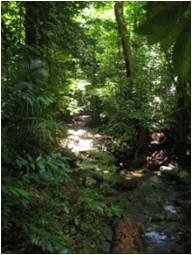Negotiating and the Daintree Forest – Prepare for the Unexpected
“A skilled global negotiator will always connect at an emotional and rational level in the negotiation and will always be on the lookout for the unexpected to occur!”
Like many in the APAC region, our family’s holiday plans to Fiji were disrupted by Cyclone Evan in December, 2012 and instead we had our holiday in Port Douglas, Australia.
One of the highlights was flying into the Daintree Forest, in the far north of Queensland, by helicopter into a reasonably isolated part of the Daintree and being taken by a guide through the forest.
The Daintree forest is estimated to be over 180 million years old – tens of millions of years older than the Amazon rainforest in South America. The plant life is amazing and as other observers have noted, the Daintree is a living museum that catalogues the evolution of plant life on Earth. Covering 1200sqkm between Mossman Gorge and the Bloomfield River north of Cairns, the World Heritage-listed Daintree is the largest continuous rainforest area in Australia and is home to the traditional indigenous owners of the land and the current custodians, the Kuku Yalanji people.
The first lesson for me, as a negotiator, came from the appreciation and understanding of the history and greatness of the Daintree. Sometimes in major negotiations we are so keen to start negotiating, that we don’t really understand the context and the emotional connection of what we are negotiating and the other people involved.
As we alighted from the helicopter my wife Gillian, our youngest daughter Hannah and I met our guide, Prue from Coopers Creek. We started the tour and it was clear that not only was she passionate about the forest, she was also passionate about teaching us how to observe and see what we would normally miss. It was like walking on the scene of Avatar and Jurassic Park all rolled into one.
She pointed to a tree, a vine and a group of ants and said boldly, “Wow, this is a perfect example of obligate mutualism!”. Obligate mutualism is a type of relationship in which the species involved are in close proximity and interdependent with one another in a way that one cannot survive without the other. Often key customers and key suppliers see themselves as independent from each other and fight over scarce resources, normally, what is the cheapest price. Then there are innovative suppliers who work with key customers as partners, who see themselves as interdependent to each other, they focus on value creation not price. For those of you looking for business examples the best would be 3M and P&G.
The final lesson relevant to negotiation is to prepare for the unexpected!
We finished the walking tour and Ryan, our pilot, carried the lunch and drinks down to the clearing in Coopers River for a swim and lunch. As we were swimming, Hannah noticed a small dark thing on her left little toe which was wiggling with great enthusiasm and when I lifted her foot it was clear it was a leech, trying as hard as possible to burrow into her toe. When I informed Hannah it was a leech, I am sure everyone in Australia heard her screams.
I finally removed the offending leech and Hannah jumped on my back still screaming. I did not expect her to do that, I expected her to rationalise that no matter where she was in the river a leech could attach itself to her.
Often in negotiations we believe that we can present a rational and compelling reason to reach an agreement and expect the other side to coolly examine our offer and, with the weight of evidence so great, say yes. Often in reality, the other side responds quite emotionally.
We have recently seen a great example with the fiscal cliff crisis in the USA. We know that prior to the end of 2012, President Barack Obama was looking for a way for the US Senate to cut a deal to lower the federal deficit through tax increases and spending cuts. Both sides of US politics believed that their requests were both rational and compelling. Neither really prepared for the unexpected, which was no deal! Both took strong positions and almost brought America to its knees, again.
Enough about negotiation lessons, wherever you are in the world, you should take a visit to the Daintree and put it on your bucket list.
Remember, when you do go to the Daintree, stay in Port Douglas, do the helicopter tourwww.skysafari.com.au and book the tour guide Prue www.ccwild.com. More importantly watch where you step and swim, as the crocodiles love tasty humans and the leeches love fresh blood! Enjoy!

